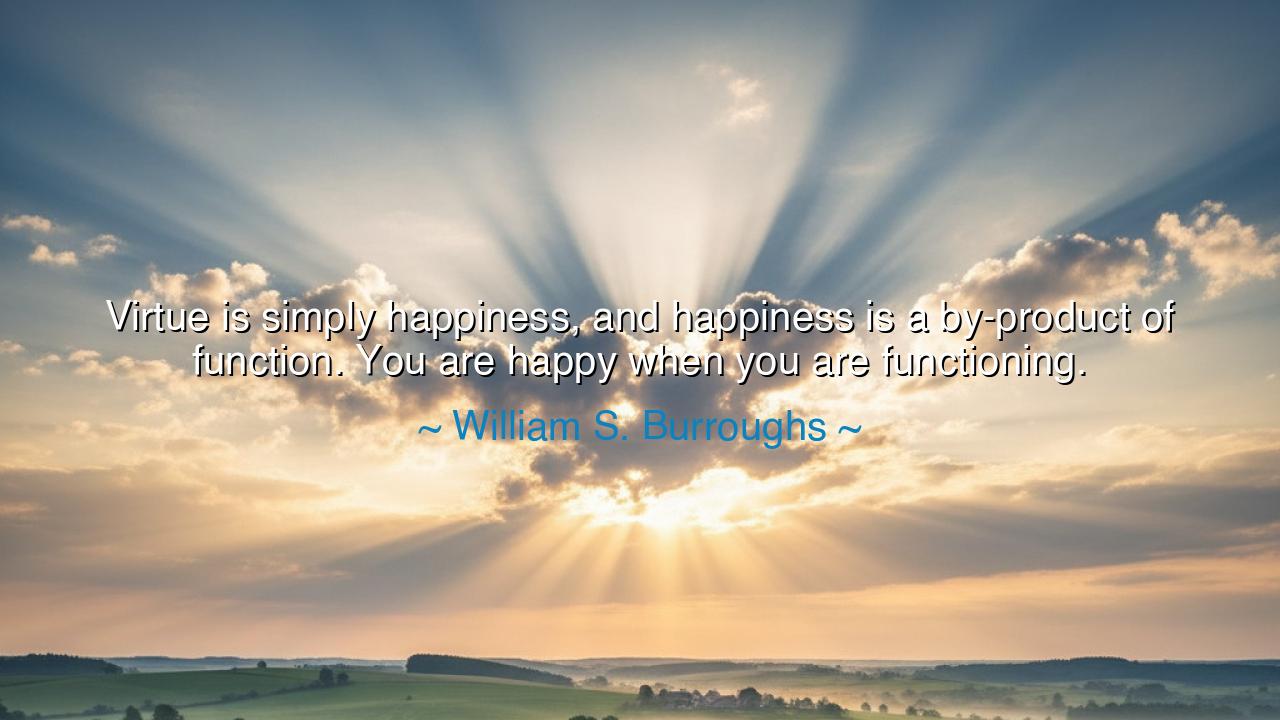
Virtue is simply happiness, and happiness is a by-product of
Virtue is simply happiness, and happiness is a by-product of function. You are happy when you are functioning.






In the voice of insight and rebellion, William S. Burroughs declared: “Virtue is simply happiness, and happiness is a by-product of function. You are happy when you are functioning.” Beneath these words lies a profound truth that reaches beyond philosophy into the rhythm of human existence itself. Burroughs, often a man of contradiction — both visionary and outcast — saw clearly what many overlook: that joy is not found in idle dreaming, but in the living act of being purposeful. For to function, to fulfill one’s role in the great design of life, is to awaken the soul’s deepest contentment.
To the ancients, virtue and function were inseparable. Aristotle taught that happiness, or eudaimonia, is not pleasure, but the fulfillment of one’s natural purpose — the exercise of the soul in accordance with virtue. A blade is not happy lying in the dust; it is happy when it cuts cleanly. A musician is not happy in silence, but in the melody born of their own discipline. So too, Burroughs reminds us that a person finds happiness only when they act in harmony with their own essence. To live virtuously, then, is not to follow cold moral codes, but to move rightly, to live truly — to function as the being one was meant to be.
In his life, Burroughs struggled with chaos, addiction, and alienation — yet in his moments of creation, when writing burned through him like fire, he felt the pulse of function. In those hours, words became his redemption, transforming pain into meaning. It was not comfort that made him happy, but purpose — the act of doing what only he could do. This is the paradox of his teaching: that happiness is not a goal to be grasped, but a side effect of living rightly. It cannot be chased or begged for; it emerges naturally, like fragrance from a blooming flower.
Consider the life of Leonardo da Vinci, who wandered between arts and sciences, inventions and philosophy. He was often restless, seldom at peace, yet when his mind was engaged — when his hands drew the curvature of the human form or sketched the flight of birds — he was alive in the purest sense. In those moments of function, he knew joy. Like Burroughs, Leonardo understood that the human spirit thrives in movement, in creation, in the act of aligning one’s talents with the order of the world. For the one who ceases to function, who forgets to create, to serve, to learn — that one ceases to live.
The virtue of function is not limited to genius or art. It belongs to all — the teacher who guides young minds, the craftsman shaping wood, the mother nurturing life, the healer mending wounds. When each fulfills their calling, they become part of the great harmony, and in that harmony, they find happiness. For misery is not born of struggle, but of stagnation. A stream grows foul only when it ceases to flow. So too does the human soul decay when it idles, cut off from its purpose.
Yet Burroughs also warns of illusion: that to mistake comfort for joy is to lose both. Many seek happiness as an end — in wealth, in leisure, in applause — yet the more they grasp for it, the further it recedes. The wise understand that happiness cannot be pursued directly, for it is the shadow of function. Do your work, live with integrity, move toward what gives life meaning — and joy will follow like dawn follows night. That is the sacred law written into the heart of existence.
Let this be the teaching to all who wander in search of peace: function is the path to fulfillment. Ask not, “How can I be happy?” but “How can I serve? How can I move? How can I create?” For in doing what is right — not what is easy — the spirit finds its truest light. When you awaken each day and give yourself wholly to your calling, whether humble or grand, you live virtuously, and from that virtue springs happiness as surely as fruit grows from fertile soil.
Thus, the teaching concludes: William S. Burroughs reminds us that the secret of joy lies not in desire, but in doing. To live well is to live with function — to act with purpose, to move in harmony with one’s nature, to fulfill the work that life demands of you. When you are functioning, you are not merely alive — you are radiant, complete, and free. Seek not happiness as an object, but as a companion to meaningful action, and you will find that, in living with purpose, you have already found your peace.






AAdministratorAdministrator
Welcome, honored guests. Please leave a comment, we will respond soon